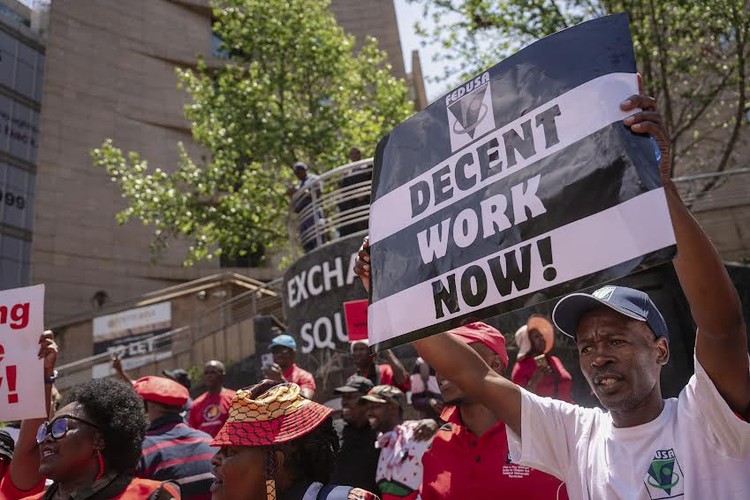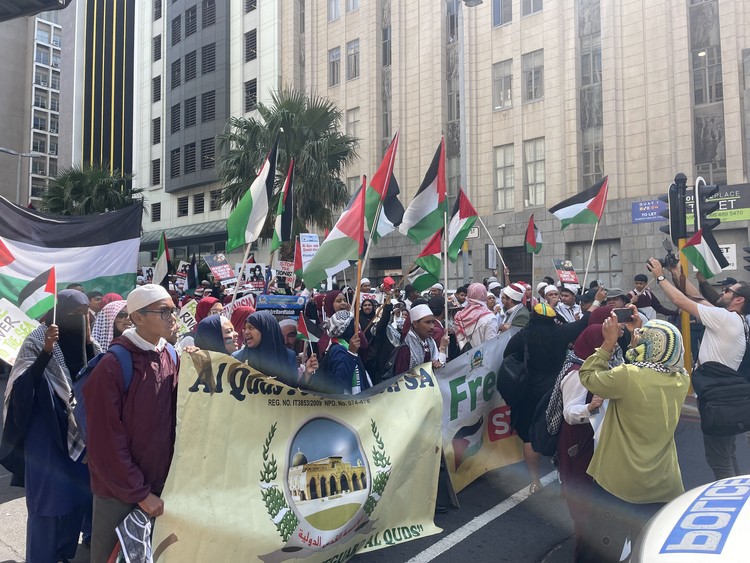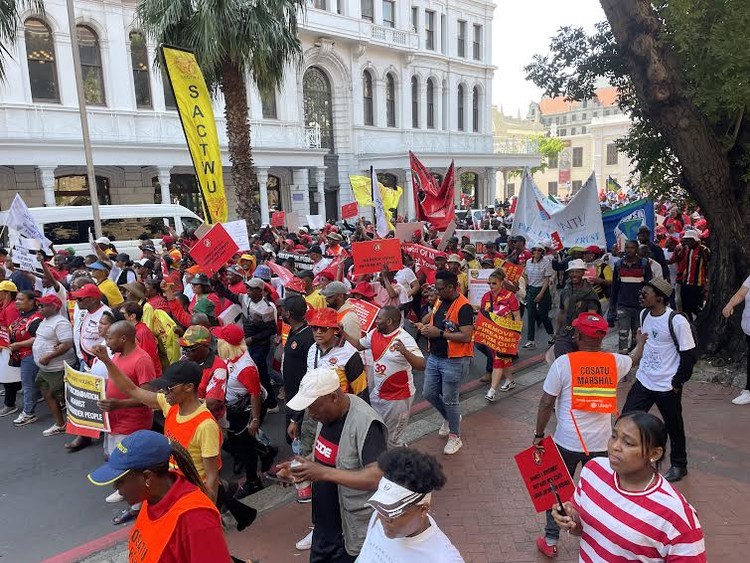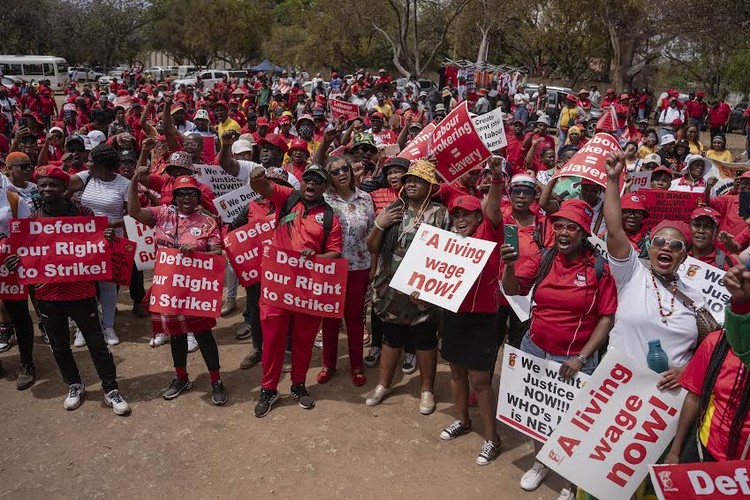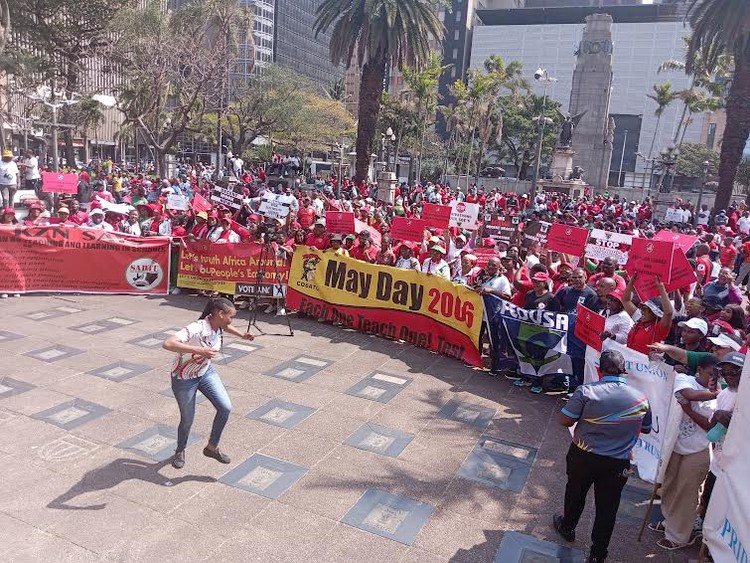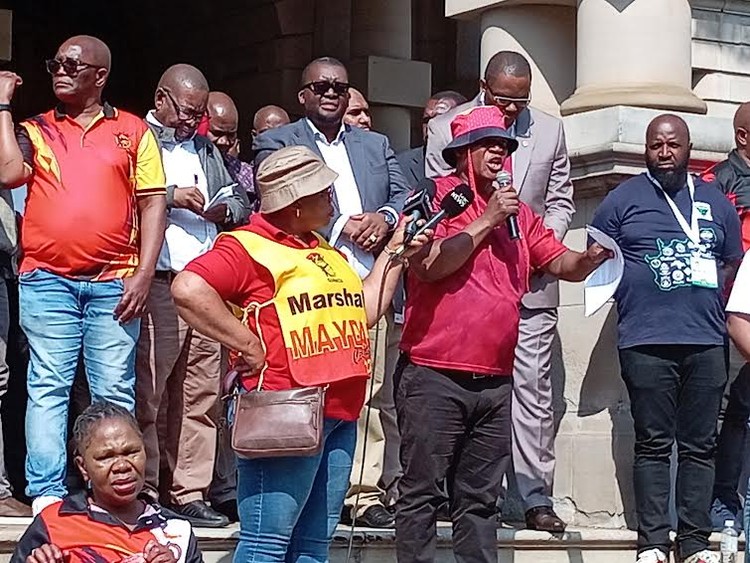Unions take to the streets to demand decent work
Hundreds of workers march in Cape Town, Joburg and Durban
Workers marched through Sandton to the Johannesburg Stock Exchange. Photo: Ihsaan Haffejee
- Hundreds of workers marched in Cape Town, Johannesburg and Durban on Monday to mark World Day for Decent Work.
- In Cape Town the marchers handed over a memorandum to Minister of Higher Education Nobuhle Nkabane demanding solutions to the cost of living crisis.
- In Johannesburg they handed over a memorandum to representatives of the Johannesburg Stock Exchange.
Hundreds of workers marched to Parliament in Cape Town on Monday to commemorate World Day for Decent Work by presenting a memorandum to Parliament. Workers also marched in Johannesburg and Durban.
Compiled by the Congress of South African Trade Unions (COSATU), the memo handed over at Parliament demands a stop to the reduction in teacher posts, measures to eliminate gender-based violence in the workplace, an urgent solution to the cost of living crisis, a reduction in electricity prices and other measures to support workers.
In Cape Town Minister of Higher Education Nobuhle Nkabane collected and signed the memo in front of Parliament. Nkabane said she was committed to reforms and would send the demands to the various departments concerned. She said COSATU leadership would receive a response by their deadline of 21 October.
COSATU Provincial Secretary Malvern De Bruyn said he hoped to show the government that the workers are angry amidst a national economic crisis and a “major bloodbath” of job losses in the Western Cape.
Before arriving at Parliament, the COSATU protesters marched down Hanover Street to the Western Cape legislature, where they were met by protesters supporting Palestine.
The metro police created a barrier between the two groups with their vehicles. Western Cape legislature opposition leader Khalid Sayed (ANC) said he was “very disappointed” by the enforced barrier.
In Cape Town the marchers were met by protesters supporting Palestine. Photo: Tori Newby
Anneline Basson, provincial deputy chairperson of the South African Clothing and Textiles Union, said she had experienced unfair labour practices and gender-based discrimination as a shop steward. She joined the march to “demonstrate this unhappiness” to the government, advocating for more government oversight in the textile industry.
“I also experienced, if you’re a very outspoken person, you’re not the most welcome person in your company,” Basson said.
Workers marched to Parliament to hand over a memorandum. Photo: Tori Newby
In Johannesburg workers marched through Sandton to the Johannesburg Stock Exchange (JSE). Members of unions affiliated to COSATU were joined by members of unions affiliated to Federation of Unions of South Africa (FEDUSA) and of the South African Communist Party (SACP).
COSATU’s Gauteng chairperson Amos Monyela said that South Africa’s working class was under attack as cost of living increases were not matching wage increases in several industries.
“The little that people are earning is being swallowed by high interest rates, high electricity costs and high food prices. That is why we are taking to the streets today. These are issues that affect all South Africans, not just COSATU members,” said Monyela.
Monyela said he was not convinced that the newly formed Government of National Unity would implement policies favourable to workers.. “The policies of some of the parties in the GNU are anti-working class and anti-poor,” said Monyela.
The marchers in Johannesburg handed over a memorandum at the Johannesburg Stock Exchange. Photo: Ihsaan Haffejee
A memorandum of demands was handed over to representatives of the JSE. The workers demanded that companies listed on the JSE do more to promote jobs. They also demanded more information on pay differentials between highest and lowest-paid employees and on the gender pay gap.
Workers marched to the City Hall in Durban. Photo: Tsoanelo Sefoloko
In Durban, members of unions affiliated to COSATU marched from King Dinizulu Park to the city hall demanding an end to retrenchments and other changes..
COSATU provincial secretary Edwin Mkhize said they were concerned about workers not getting the service they are due from the Unemployment Insurance Fund and about unfair dismissals. At the city hall, the workers handed over a memo to Minister of Science and Technology Blade Nzimande who said he would hand it over to President Cyril Ramaphosa.
The marchers’ memo was accepted by Minister of Science and Technology Blade Nzimande. Photo: Tsoanelo Sefoloko
Support independent journalism
Donate using Payfast

Next: Food meant for poor families is rotting in a Gauteng food bank
Previous: Phola residents say mining has brought misery not benefits
© 2024 GroundUp. This article is licensed under a Creative Commons Attribution-NoDerivatives 4.0 International License.
You may republish this article, so long as you credit the authors and GroundUp, and do not change the text. Please include a link back to the original article.
We put an invisible pixel in the article so that we can count traffic to republishers. All analytics tools are solely on our servers. We do not give our logs to any third party. Logs are deleted after two weeks. We do not use any IP address identifying information except to count regional traffic. We are solely interested in counting hits, not tracking users. If you republish, please do not delete the invisible pixel.

